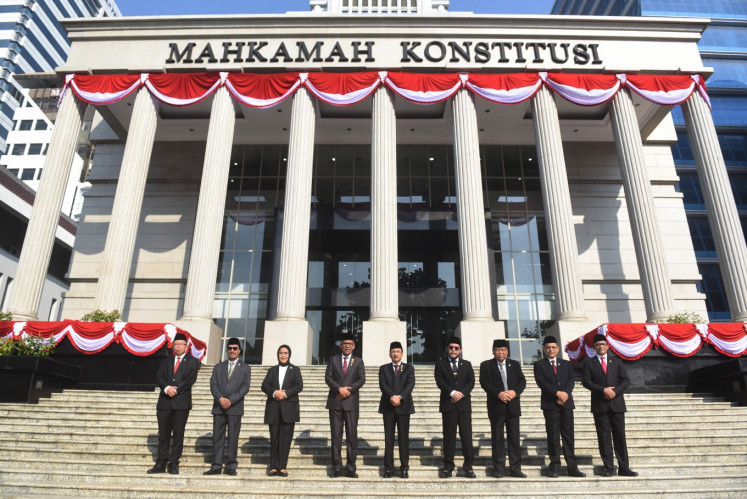Popular Reads
Top Results
Can't find what you're looking for?
View all search resultsPopular Reads
Top Results
Can't find what you're looking for?
View all search resultsThe Lady Gaga saga and Asia’s religious radicals
American talk show hosts certainly have a burning question for Lady Gaga when she comes back home: “How did you cope with the hurdles of religious protests against you in Asia?” The protest from Indonesian Islamic hard-line groups came after protests from Christian radicals in South Korea and the Philippines
Change text size
Gift Premium Articles
to Anyone

A
merican talk show hosts certainly have a burning question for Lady Gaga when she comes back home: “How did you cope with the hurdles of religious protests against you in Asia?”
The protest from Indonesian Islamic hard-line groups came after protests from Christian radicals in South Korea and the Philippines. Perhaps these protests were not among the challenges her management team expected to face in Asia — conservative Christianity seems to be out of place in Asia and Southeast Asian Islam is supposedly relatively moderate.
East and Southeast Asia are now quite distanced from their Hindu and Buddhist roots and images. Catholicism in the Philippines always amuses Westerners, especially Americans, who always see their perennial ex-colony as a Latin-American country transplanted into Asia.
But while Latin American Catholic churches might highlight social issues over abortion and gay rights (which is also the case in Indonesia, where the church supported Lady Gaga’s concert for adults), the conservative Filipino Catholic Church joined the Christian condemnation of Lady Gaga over “morally offensive images and lyrics”.
South Korea is now arguably the most Christian country in Asia, with Christians accounting for 18 percent of the population and now the second-largest missionary-sending nation behind United States.
Non-denominational churches, modeled after American evangelical and born-again churches, last year successfully asked the president of the officially secular country to express his Christian faith at a national prayer breakfast.
These groups were calling for cancellation of Lady Gaga’s concert in Seoul for the “promotion of inappropriate behavior for youngsters, including homosexuality and the mocking of religious figures”.
Fortunately, the evangelical Christians, who have obsessions with devils and Armageddon, don’t accuse Lady Gaga of being a Satanist. The honor belongs to Indonesia’s Muslim radicals, from the religious affairs minister who called her a “devil worshipper” to the religious singer who said that the concertgoers would be “baptized” as Satan-worshippers.
Indonesia, therefore, holds the distinction as the place where the hard-liners’ demand for a cancellation is almost certainly fulfilled. Just a few years ago, Indonesia was as an alternative for Malaysian fans who were disappointed with their government’s and moral crusaders’ vetoes against incoming American female singers.
Various parties in these three Asian countries point out that there are many local artists who also sport raunchy lyrics and costumes, and yet never have their concert plan attacked.
Feminists have also questioned why religious figures and politicians focus on the morality of foreign women while having no problem with openly gay rock icons.
Detractors of Lady Gaga admitted, to some degree, that they target her because she’s foreign, citing “negative foreign influences” in their line of complaints. As it is the case in the US, some female artists in Indonesia, the Philippines and Korea mix their sensual images and suggestive lyrics with significant presence in religious premises and activities. Everyone accepts them as a sultry pop artist who can be religious, and vice versa.
Certainly, Lady Gaga strongly supports sexual freedoms — both homosexual and heterosexual — but it is a big surprise that her biggest controversies are to be found in Asia rather than in the US or Latin America.
Japan loves her for her relentless support for the nation last year and Mexicans cheered her for her protest against US immigration laws. Her Born This Way Foundation fights bullying among American teenagers. Certainly those acts don’t reflect the attitude of a devil’s worshipper.
The problem lies with how Asia’s religious radicals view the world and how they are attempting to claim bigger power in their nations’ capitals. During the Indonesian controversy, I was finishing reading The Tenth Parallel by Eliza Griswold, who visited nations in Africa and Asia that lie along the 10th parallel, including Indonesia and the Philippines.
In these regions, many Muslims and Christians believe that they cannot co-exist and they are fighting a holy war. South Korean Christians joined the fray through their missionaries and their relations with Southeast Asian Christians. They believe that the best solution to corruption, poverty and environment destruction is a strongly religious society.
For radical Christians, despite their alliances and cooperation with various American churches, agree with American Christians that the US is a sinful society which has abandoned Jesus. Radical Muslims see enemies everywhere. Christians, atheists, Jews, Satanists, Ahmadis, Shiites or even the so-called “Illuminati” (whatever that means) are all the same.
Lady Gaga, for these two kinds of people, represents the sinful America. She’s female and a blond Caucasian who, while having a weird wardrobe and shocking routines, is deemed more dangerous for her messages of acceptance for gays and sexual freedoms.
Protesters in South Korea, Indonesia and the Philippines, one way or another, accuse her of corrupting the youth. Liberals say that hearing her songs or even watching her concert will not make anyone turn gay.
But that’s not the conservatives’ point. To accept the visit of the singer is to imply that the country tolerates her view. They want to assure themselves and the public, the object of their power quest, that moral relativity and second opinions are not to be tolerated.
If Lady Gaga sends “the wrong message”, then their “right message” would be for the people to conform to their views and to their brand of religious expression.
A local artist will, sooner or later, endorse and warm up to the religious leaders, and while she might sing sexual songs, she will not sing anything about sexual tolerance.
A foreigner would leave in the morning after the concert and is not accountable to those hard-liners. And that what makes them hate her.
The writer is a graduate of La Trobe University in Melbourne, Australia.









